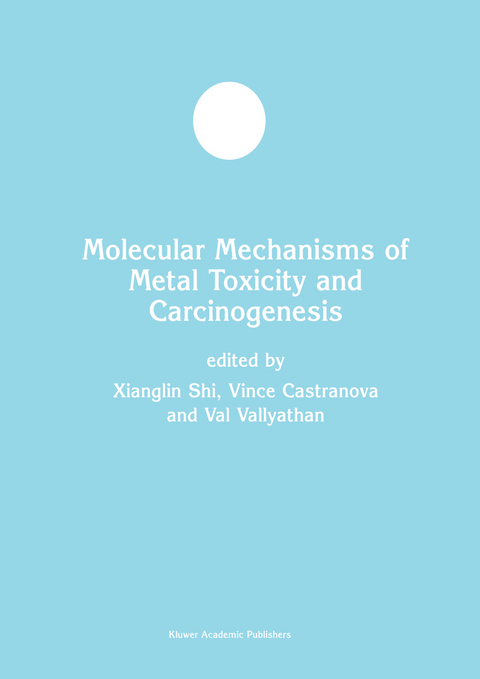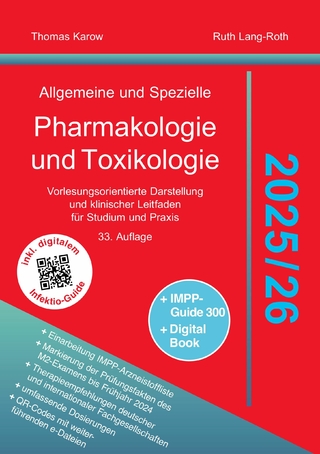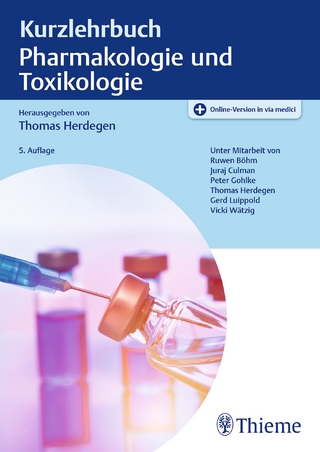
Molecular Mechanisms of Metal Toxicity and Carcinogenesis
Springer-Verlag New York Inc.
978-1-4613-5242-6 (ISBN)
Molecular mechanisms of metal toxicity and carcinogenesis.- Cadmium-induced apoptosis and phenotypic changes in mouse thymocytes.- Cytotoxicity and transcriptional activation of stress genes in human liver carcinoma cells (HepG2) exposed to cadmium chloride.- Arsenic-induced NFiB transactivation through Erks-and JNKs-dependent pathways in mouse epidermal JB6 cells.- Lead-related effects on rat fibroblasts.- In vivoreduction of chromium (VI) and its related free radical generation.- Atrazine potentiation of arsenic trioxide-induced cytotoxicity and gene expression in human liver carcinoma cells (HcpG2).- CombiningDmsophila melanogastersomatic-mutation-recombination and electron-spin-resonance-spectroscopy data to interpret epidemiologic observations on chromium carcinogenicity.- Carcinogenic potential and genomic instability of beryllium sulphate in BALB/c-3T3 cells.- Cr (VI) induces cell growth arrest through hydrogen peroxide-mediated reactions.- Comparison of roles of three mitogen-activated protein kinases induced by chromium(VI) and cadmium in non-small-cell lung carcinoma cells.- Differential zinc and DNA binding by partial peptides of human protamine HP2.- Reduction of Cr (VI) by cysteine: Significance in human lymphocytes and formation of DNA damage in reactions with variable reduction rates.- Transactivation of RARE and GRE in the cellular response to arsenic.- Orthopaedic implant related metal toxicity in terms of human lymphocyte reactivity to metal-protein complexes produced from cobalt-base and titanium-base implant alloy degradation.- Arsenic contamination of groundwater and prevalence of arsenical dermatosis in the Hetao plain area, Inner Mongolia, China.- Involvement of Erks activation in cadmium-induced AP-1 transactivationin vitroandin vivo.- Chromium (VI)-induced oxidative stress, apoptotic cell death and modulation of p53 tumor suppressor gene.- Review.- Carcinogenic metals and NF-?B activation.- Effects of glutathione on chromium-induced DNA crosslinking and DNA polymerase arrest.- Minireview.- Cell apoptosis induced by carcinogenic metals.- Gene expression profile in response to chromium-induced cell stress in A549 cells.- Cr (VI) increases tyrosine phosphorylation through reactive oxygen species-mediated reactions.- Molecular biology of nickel carcinogenesis.- Model reactions of Cr (VI) with DNA mediated by thiol species.- On the mechanism of Cr (VI)-induced carcinogenesis: Dose dependence of uptake and cellular responses.- Index to Volume 222.- Instructions to Authors.
| Reihe/Serie | Developments in Molecular and Cellular Biochemistry ; 34 |
|---|---|
| Zusatzinfo | VII, 242 p. |
| Verlagsort | New York, NY |
| Sprache | englisch |
| Maße | 210 x 297 mm |
| Themenwelt | Studium ► 2. Studienabschnitt (Klinik) ► Pharmakologie / Toxikologie |
| Naturwissenschaften ► Biologie ► Biochemie | |
| ISBN-10 | 1-4613-5242-8 / 1461352428 |
| ISBN-13 | 978-1-4613-5242-6 / 9781461352426 |
| Zustand | Neuware |
| Haben Sie eine Frage zum Produkt? |
aus dem Bereich


